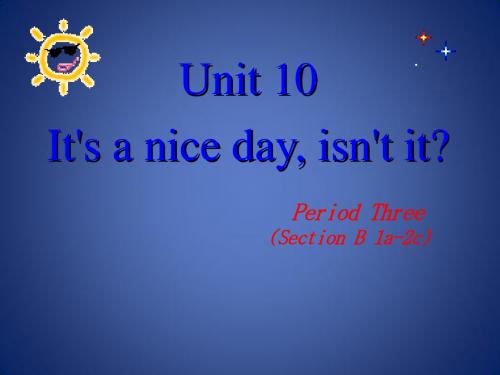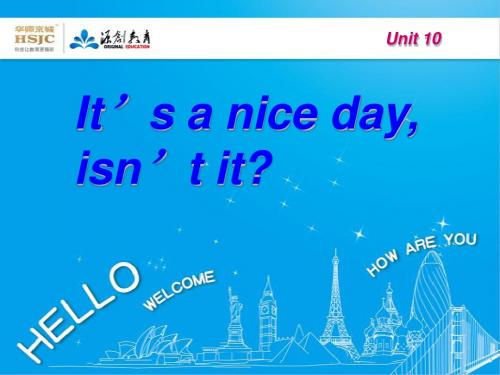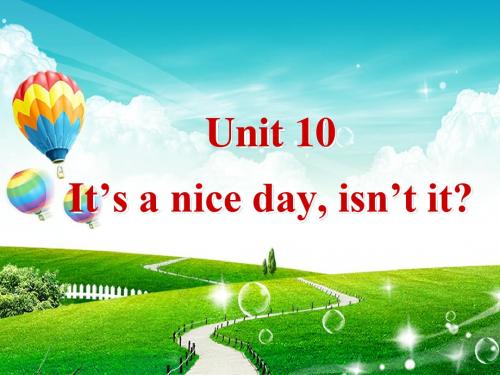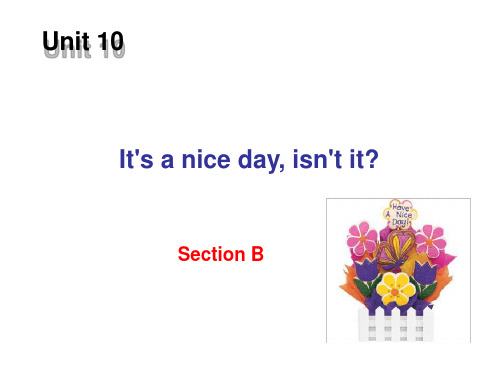Unit 10 It's a nice day ,isn't it 素材 (人教版八年级下) (3)
Unit10《It’s a nice day, isn’t it_ word_Section

aren't you? Woman 1: That's right. So tell me about yourself, Rita.
Do you play any sports? Girl 1: Yes I do. I like sports. I play tennis and ping-pong
Polite 2__4_5__7_8__9_10 Impolite_1__3_6____
1b PAIRWORK
Make up a conversation using one of the questions from activity 1a.
A: Do you like thrillers? B: No, but I love comedies.
Do you like cartoons?
You’re Anna’s brother, aren’t you?
It’s delicious, isn’t it?
How much did your skirt cost?
The train is always late, isn’t it?
How big is your apartment?
11. Nobody knows the answer,
______d_o__th__e_y__/_d_o_e_s? he
12. There is something wrong with your watch,
Unit 10 It’s a nice day, isn’t it -1

4. Scientists now know __________.
a. man’s brain helps him to learn to speak
b. why apes can learn a few words
c. how children learn to speak
d. What happens when men speak
They can’t think like
us because they can’t think about the past or the future. Language is a wonderful thing. Man has been able to build a modern world because he has language.
Answer:
2 _______ can think about the past or the future. a.Apes b. Animals c. Men d. Neither animals nor men
3. An ape cannot _______.
a. make noise b. understand things c. learn words d. speak like man
Every child can speak his own
language very well when he is 4 or 5----but no animal learns to speak. How do children learn? Scientists do not really know. What happens when we speak? Scientists do not know. They only know that man can speak because he has a big brain.
It’s a nice day, isn’t it PPT课件 15 人教版

A: I’m going to Today Beach. 2_._W__h_e_r_e_d_o__y_o_u_u__su_a_l_l_y_g_o_?__.
B: I usually go to Sandy Beach. A: _3_. _Is__it_v_e_r_y__c_ro_w__d_e_d_? B: No, it’s never crowded. Well, have
•
8、真正的爱,应该超越生命的长度、心灵的宽度、灵魂的深度。
•
9、永远不要逃避问题,因为时间不会给弱者任何回报。
•
10、评价一个人对你的好坏,有钱的看他愿不愿对你花时间,没钱的愿不愿意为你花钱。
•
11、明天是世上增值最快的一块土地,因它充满了希望。
•
12、得意时应善待他人,因为你失意时会需要他们。
•
•
46、在浩瀚的宇宙里,每天都只是一瞬,活在今天,忘掉昨天。
•
47、小事成就大事,细节成就完美。
•
48、凡真心尝试助人者,没有不帮到自己的。
•
49、人往往会这样,顺风顺水,人的智力就会下降一些;如果突遇挫折,智力就会应激增长。
•
50、想像力比知识更重要。不是无知,而是对无知的无知,才是知的死亡。
•
51、对于最有能力的领航人风浪总是格外的汹涌。
•
32、肯承认错误则错已改了一半。
•
33、快乐不是因为拥有的多而是计较的少。
•
34、好方法事半功倍,好习惯受益终身。
•
35、生命可以不轰轰烈烈,但应掷地有声。
•
36、每临大事,心必静心,静则神明,豁然冰释。
•
37、别人认识你是你的面容和躯体,人们定义你是你的头脑和心灵。
Unit;10;It’s;a;nice;day,;isn’t;it-

Unit;10;It’s;a;nice;day,;isn’t;it?unit 10 it’s a nice day, isn’t it?一. 教学内容:unit 10 it’s a nice day, isn’t it?二. 教学过程:1. 重点短语:tell sb. about sth. 告知某人某事,hate doing sth. 厌烦做某事help sb. with sth. 协助某人〔做〕某事,think of 想起hundreds of 数百,成百上千,in the future 在将来come true 实现,be careful 当心,留神;at least 至少get along 相处融洽,look through 阅读,be able to 能够,会space station 太空站,go skating 去滑冰2. 交际用语:〔1〕it’s a nice day, isn’t it?〔2〕what a nice day, isn’t it?〔3〕it looks like rain, doesn’t it?〔4〕i hope so /not.〔5〕so do i.3. 语法:学习反意疑问句。
三. 重、难点讲解:1. do you think it’ll stop by noon?此句中的by noon 意为“在中午之前”,by 的意思是“不迟于,在……之前,到……为止”。
〔1〕please be here by 4:00 p.m. 请在下午四点钟之前到这儿。
〔2〕by the end of last month 到上个月末by 还可以表示方式、方法、手段、通过等,也可用作介词,表示“在……旁边”。
〔3〕jim got the news by phone. 吉姆是通过电话得到这个消息的。
〔4〕he makes a living by selling vegetables. 他以卖菜为生。
八年级英语Unit 10 It's a nice day,isn't it

Unit 10 It’s a nice day, isn’t it?
Pairwork.
Section A
3b Practice the conversation in activity 3a. Then write and practice another conversation with your partner. You can use situations like these:
Section A
a. I hope so. I want to go swimming. b. Yes. It rains every Saturday! c. At Franklin Lake. 富兰克林湖 d. Oh? Where do you swim? 在中午之前 e. Do you think it’ll stop by noon? f. It always rains on the weekend, doesn’t it? g. Do you ever go there?
It’s really cold today, isn’t it? The No. 15 bus stops here, doesn’t it?
Unit 10 It’s a nice day, isn’t it?
Go through
Section A
反意疑问句的表达
Grammar It’s really windy today, isn’t it? Focus You’re Ben’s sister, aren’t you?
Unit 10 It’s a nice day, isn’t it?
Listening
Section A
1b Listen and number the pictures above in the order you hear them.
英语:Unit10It’saniceday (3)

? Friends like you make it a lot easier to get along in a new place.
当不定式(短语)、动名词(短语)或从句在某 个句子中作宾语时,为保持句子结构前后平衡,避免 句式结构的混乱,因此常用 it作形式宾语,而将真正 的宾语放在句尾, It 本身并无意义。
This kind of brick feels like wood. 这种砖摸起来像木头。
? feel like+名词/代词 : 觉得想做…… I feel like a rest after the long journey. 长途旅行后我想休息一下。
? feel like+反身代词 :感到舒适;感觉身 体好。( like可省略)
a lot of = lots of, 可修饰可数或不可数名词,意 为“许多, 大量的”,相当于 many或much.
There's a lot of work to do and a lot of people have been sent there.
Attention !
a lot, a lot ofmany或much。
Unit 10 It's a nice day, isn't it?
Section B
A grateful heart
What should we thank for?
3a Read the three notes. What
should the writers thank for? Fill in the blanks with the correct words.
Unit10it's a nice day ,isn't it 课件1
Explanation
I hope so.
我希望如此。
此处 so 是副词,用作替代词。意为
“如此” “如是”。如:
— Our team will win. 我们队会赢的。
— I hope so. 我希望如此。
Pairwork :Make a successful small talk.
You may use these expressions:
Conversation 2
Girl 3: This line is moving slowly, isn't it?
Woman: Yes, it is. We've been here for 20
minutes already.
Girl 3: I hope the movie is good. Woman: So do I. Do you think it's going to rain? Girl 3: I hope not! Woman: Me, too.
I’m going to be late for school.—So am I.
2a To have successful small talk, both people need to ask questions. Listen to the three conversations. Are they examples of successful or unsuccessful small talk? Write “S”(for successful) or “U”(for unsuccessful) in the blanks.
The train is always late, isn't it?
英语:Unit 10 It’s a nice day isn’t it
What’s your favourite … …? Why do you like it best? What do you think of it? ……
My story
I like music very much,because music is wonderful,isn’t it ? When we are tired,when we are stressed out,just listen to the music.Music can make us relaxed,can’t it? Music is the only language in the world,isn’t it? So please love music and enjoy listening to the music,it also makes you intelligent.
have a party
Group work. 1.Playing computer games is interesting,isn’t it? 2.We should have a lot of pocket money,shouldn’t we? 3.Smoking is very cool,isn’t it? 4.Wearing the uniform isn’t fashionable, is it? 5.We can use the mobile phone at school ,can’t we? 6.Falling in love early isn’t good,is it?
Hello,everyone!
Unit 10
It’s a nice day , isn’t it ?
It’s a nice day, isn’t it? It was a sunny day yesterday, wasn’t it?
初二Unit 10 It’s a nice day, isn’t it
Unit 10 It’s a nice day, isn’t it?目标认知重点词汇与短语:noon, look through, cross, get along, traffic, baby, fan, at least, feel like,help …with…,sandy, slow重点句型:It’s a nice day, isn’t it? 天气不错,不是吗?It always rains on the weekend, doesn’t it?在周末总下雨,是不是?It looks like r ain, doesn’t it? 看起来要下雨,不是吗?No, it doesn’t. 不,不是。
重点语法:反意疑问句日常用语:---It’s really windy, isn’t it? ---有风,是吧?---Yes, it is. ---对,有风。
---You’re Ben’s sister, aren’t you? ---你是Ben的妹妹,不是吗?---Yes, I am. ---是的,我是。
---The No. 15 bus stops here, doesn’t it? ---15路公交车在这停,不是吗?---Yes, it does. –是的,在这停。
---You don’t love violin music, do you? ---你不喜欢小提琴音乐,是吗?---Yes, I do. ---不,我喜欢。
I hope the bus comes soon. 我希望车快来。
Is it very crowded? 很挤吧?Thanks for showing me the school last week. 谢谢你上周带我参观校园。
精讲巧练1. It’s a nice day, isn’t it? 天气不错,不是吗?点拨这是一个反意疑问句,表示提出情况或看法,问对方同不同意。
Unit 10 It's a nice day,isn't it
Unit 10 It’s a nice day,isn’t it?反义疑问句:反义疑问句表示提问者对某事有一定的主见,但没有把握,于是借一个简短的一般疑问句来得到对方的证实。
二句型(反义疑问句):①前肯后否;②前否后肯。
注意:1、附加的简短的疑问句的主语不能用名词,只能用代词;谓语只能用系动词、助动词、情态动词,且要遵循“人称、时态、数一致”如:1)He isn’t a teacher ,is he?2)Lin went to his uncle’s home ,did he?2、对于反义疑问句的回答,如果是“前否后肯”的句子,思维正好同中国人相反。
如:----He doesn’t like singing ,does he?他不爱唱歌,是吗?——Yes,he does./No,he doesn’t.不,他喜欢。
/是的,他不喜欢。
特殊的反义疑问句:1.祈使句后一般加上will you 例如Look at the blackboard, will you?看黑板,好吗? 2 Let's...,后的反意疑问句用shall we例如:Let's go home, shall we/ shan't we? 回家吧,好吗? 3 Let us/me...后的反意疑问句用will you例如:Let me have a try, will you? 让我试一试,行吗? 4 当陈述部分有否定意义的词:few, little, ,hardly, never, not, no, no one, nobody, nothing, none, neither等,其反意疑问句需用肯定结构。
1You have never been to Beijing, have you? 2She has few friends, does she? 3Tom had little work to do, did he? 4You can hardly do the work, can you?He sure is!他当然是了!Thank-you note for a gift.一份礼物的感谢信a thank-you note for..感谢信take notes 做笔记,做记录Do you think it will stop by noon?你认为它会在中午停止吗?By用法(1) go to school by bus.(2)We have learned a lot of things by the end of the term.到期末止,我们学到了很多东西。
- 1、下载文档前请自行甄别文档内容的完整性,平台不提供额外的编辑、内容补充、找答案等附加服务。
- 2、"仅部分预览"的文档,不可在线预览部分如存在完整性等问题,可反馈申请退款(可完整预览的文档不适用该条件!)。
- 3、如文档侵犯您的权益,请联系客服反馈,我们会尽快为您处理(人工客服工作时间:9:00-18:30)。
反意疑问句一.反意疑问句表示说话人对所陈述的事情有所怀疑或不肯定,想通过对方的回答来加以肯定或否定。
▲反意疑问句的构成有两种。
第一种结构是:肯定的陈述句+逗号+一般问句的简略否定+问号,对于反意疑问句的肯定或否定回答与一般疑问句的回答方式一样。
—You can help him,can’t you?你们能帮助他,是不是?—Yes,we can.是的,我们能帮他。
—He lives in the next room,doesn’t he?他住在隔壁的房间里,是不是?—No,he doesn’t.不,他不住在隔壁的房间里。
▲第二种结构是:否定的陈述句+逗号+一般疑问句的简略肯定+问号。
对于这种形式的反意疑问句作回答的时候.不要过分注重问句中的否定词not在前还是在后,只要事实是肯定的,就用Yes,如果事实是否定的,就用No。
—Your sister isn’t coming back today,is she?你姐姐今天不会回来,是吗?—No,she isn’t.是的,她今天不会回来。
【特别提示】当陈述句为否定式时,肯定回答yes应译为"不",否定回答no应译为"是"。
—You can't speak English, can you?—Yes, I can. 不对,我会(讲英语)。
—No, I can't. 对,我不会(讲英语)。
二.反义疑问句需要注意的情况和句型:1.当陈述句部分中含有 no, none , never, nothing 等否定词或 few, little, hardly,seldom等半否定词(具有否定意义的词)时,疑问部分常用肯定形式。
Few people knew the news, did they?Tom has never been to England, has he?但陈述句中如果带有否定意义的前缀和后缀的单词时,整个句子仍视为肯定句,反意疑问部分多用否定形式。
如:She is unhappy, isn’t she?2.当陈述部分是there be 存在句型时,附加疑问句的主语也用there。
There is a book on the desk, isn't there?3.当陈述部分的主语是表示物的不定代词everything, anything, nothing等,附加问句的主语用it;当陈述部分的主语是:等everyone, everybody, someone, no one, nobody, somebody合成代词时,附加疑问句的主语非正式文体中往往用they。
Everything begins to grow in spring,doesn’t it?Everyone is here today , aren’t they?4、.当陈述部分的主语是不定式、动名词、从句、this或that,附加疑问句的主语用it。
(是those, these则用they)This is beautiful flower, isn’t it?These are his book, aren’t they?5.感叹句的附加疑问句,其谓语要求用否定句。
What beautiful colors, aren’t they?6.当主语是I 时,完成反意疑问句时仍用I 。
尤其陈述部分是I am ---,反问时动词用aren’t I ?eg: I am a teache r, aren’t I ?7.祈使句后面的附加疑问句问题A) 祈使句是否定形式,附加疑问句只能用will you。
B) 祈使句是肯定形式,附加疑问句用肯定、否定均可。
C) Let开头的祈使句要注意:(1) .Let’s 在意义上包含谈话的对方在内,表示提出建议或征求对方意见,以Let’s 开头的陈述句完成反意疑问句时用shall we ?eg: Let’s go there on foot, shall we?(2). Let us 在意义上一般不包含谈话的对方在内,表示请求对方允许做某事的含义,let 有allow的意思。
以Let us 开头的陈述句或其它祈使句完成反意疑问句时用will you ?Let us have a look at the photo, will you?(3)Let me 开头表示请求,附加疑问句用will you,或用may I。
8.(1)陈述部分中有have一词,且表示“所有”含义时,附加疑问句部分既可用have也可用do。
(2)陈述部分中有have to,附加疑问句部分用do。
He has a car, hasn’t he?/doesn’t he?The young man have to do the work,doesn’t he?9.陈述部分的谓语是used to 时,疑问部分用didn't +主语或 usedn't +主语。
例如:He used to take pictures there, didn't he? / usedn't he? 他以前常在那儿拍照,是吗?10.带情态动词dare或need的反意疑问句,疑问部分常用 need (dare ) +主语。
例如:We need not do it again, need we ? 我们不必重做一遍,是吗?He dare not say so, dare he? 他不敢这样说,是吗?当dare, need 为实义动词时,疑问部分用助动词do + 主语。
例如:She doesn't dare to go home alone, does she? 她不敢独自回家,是吗?11.陈述部分有must,且表示“必须”时,附加疑问句部分用mustn’t,如果表示“必要”则用needn’t。
陈述部分中是mustn’t表示“禁止”时,附加疑问句部分用must。
陈述部分中的must表示“一定”、“想必”等推测意义时,附加疑问句部分而是根据陈述部分的谓语动词或其助动词来定。
He must be a doctor, isn't he? 他肯定是医生,是吗?You must have studied English for three years, haven't you? / didn't you? 你一定读过三年英语,对吗?He must have finished it yesterday, didn't he? 他肯定是在昨天完成任务的,是吗?12.当陈述部分是一个(带that引导宾语从句的)主从复合句时,附加疑问句的主谓要和主句的主谓保持对应关系。
但是,当陈述部分的主语是第一人称(I、we): I(don’t) suppose/think/ believe/imagine/expect等结构时,附加疑问句的主语和谓语要和从句的主语,谓语保持一致关系; 而且要注意到否定的转移问题,附加疑问句部分是肯定形式还是否定形式则要与I(don’t)suppose/think/believe/imagine/expect相反I think she will like the present,won’t she?I don’t think he is interested in the film, is he ?三. 五个必须1. 时态必须一致.即陈述句和简略问句必须同一时态。
He is a boy, isn't he?(一般现在时)2. 人称必须一致.即陈述句和简略问句必须同一人称。
May is a girl, isn't she?(第三人称单数)3. 形式必须一致.即陈述句和简略问句的形式应为:"前肯定、后否定"或"前否定、后肯定"。
She is thin, isn't she? (前肯定,后否定)You don't have a bike, do you? (前否定,后肯定)4. 简略问句的主语必须用人称代词。
Wu Dong is tall, isn't he?(人称代词)The students like English, don't they? (人称代词)【特别提示】在There be句型中,疑问句部分用be (not) there形式,不能用be (not) it (they)形式。
There is a book on the desk, isn't there?5. 否定形式的简略问句,not必须与be动词、助动词、情态动词等缩写,不能分开写。
We are boys, aren't we?(不能写成 are not)She sings well, doesn't she?(不能写成does not)He can draw, can't he?(不能写成can not)反意疑问句技巧一、如何巧解反意疑问句第一招:前肯后否;前否后肯;系、助、情态、代词紧跟。
①一般情况下,反意疑问句的前后两部分,其肯定和否定一定要前后相反。
②疑问部分一般为系动词、助动词、情态动词,后跟前面陈述部分主语的代词形式。
如:Tom was away yesterday, wasn’t he﹖汤姆昨天没来,是不是?第二招:先断“定”,后找“动”,再换“代”。
巧解反意疑问句的切入点是首先判断该用肯定还是否定,然后观察前面的谓语动词,若含有系动词或情态动词就直接使用,若为动词原形、第三人称单数、过去式,则用do does did;最后根据前面的主语确定代词形式。
且看例句分解:The students all went to Beijing last week, ?A.前肯定,后面当然为否定式;B.动词为went,后面用didC.前面主语是the students, 后面代词当然用they。
可见:答案为didn’t they。
典型例题1.—Jack hasn't paid for the school things, has he?—________. His father will pay for him.A.Yes,he has B.No,he hasn't C.Yes,he did D.No,he didn't 2.The lady couldn't say a word when she saw the snake, ________?A.could the lady B.couldn't the ladyC.could she D.couldn't she (2004·湘潭)3.—I haven't seen you for weeks. How are you getting on with your English?—________, thanks.A.Very well B.That's OK C.I'm all right D.Too bad4.—I'm going on a trip to London after the exam.—Really? ________!A.Have a nice time B.CongratulationsC.It's nice of you D.OK (2004·四川资阳)5.We have learned________ 10 English songs this term.A.at all B.at once C.at times D.at least反意疑问句49题1.Lend me your bike, ________?2.Let’s have a walk, ________?3.Let us do it by ourselves, __________?4.I’m a teacher, _________?5.She never said she would go there, __________?6.His brother hasn’t any books, __________?7.We’d better have a word with him, _________?8.You’d like some tea, __________?9.I don’t think they can finish the work, ________?10.Nobody called on me, ____________?11.Somebody is waiting for you, __________?12.There won’t be any trouble, ____________?13.Nothing can stop us now, _____________?14.Everything is all right, _____________?15.She has few good reasons for staying, __________?16.He seldom goes home, ___________?17.You used to get up early, __________?18.She doesn’t dare to ask me, ___________?19.There used to be a church behind the cemetery, _______?20.We had to take the first train, __________?21.My brother often has colds, __________?22.I must answer the letter, _________?23.We ought to read this book, _________?24.You must have stayed at home last night, _________?25.Something’ll have to be done about the price, _________?26.They must be hungry, __________?27.I suppose you know the meaning of the word, _________?28.We’ve saved nothing this year, ___________?29.Don’t forget to phone me, ____________?30.Let me go, ____________?31.Go to the cinema now, ___________?32.What beautiful weather, _________?33.You must have studied English for many years, _________?34.you dare do it, ___________?35.We may go to the cinema, ___________?36.You dare do it, _____________?37.You did do your homework yesterday, __________?38.We mustn’t be late, ____________?39.Everyone’s having a good time, __________?40.They don’t need to go there, ___________?41.This is a lovely garden, __________?42.I don’t believe she knows it, _____________?43.He failed in the exam, ____________?44.She is unhappy, ____________?45.John said nobody was fit for the job, _________?46.You’d rather I didn’t say anything, ____________?47.You couldn’t lend me a novel, _____________?48.He hardly knew about it, ____________?49.There is nothing wrong with your radio, _________?答案与简析1.B 本题考查了反意疑问句的回答。
